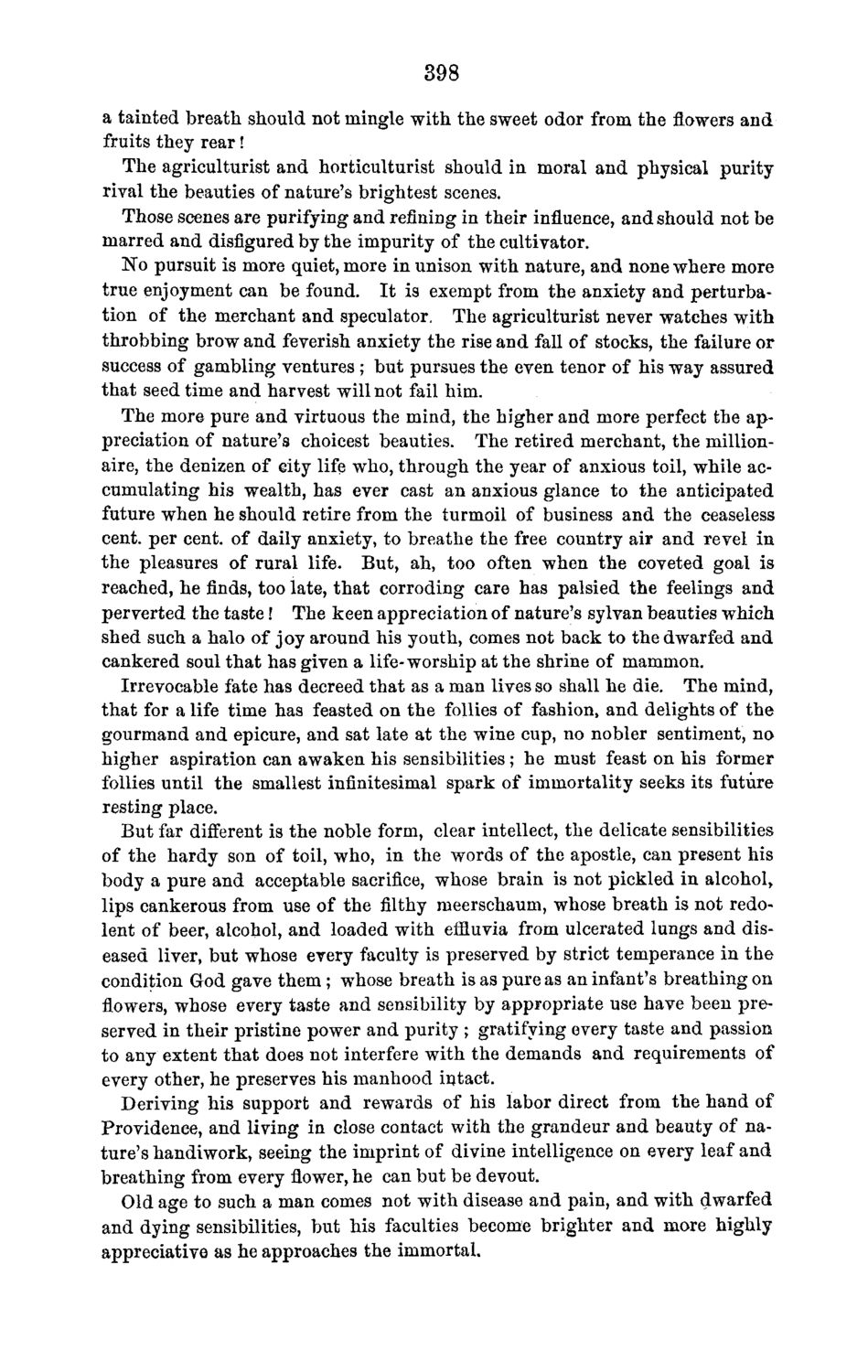| |
| |
Caption: Board of Trustees Minutes - 1870
This is a reduced-resolution page image for fast online browsing.

EXTRACTED TEXT FROM PAGE:
398 a tainted breath should not mingle with the sweet odor from the flowers and fruits they rear! The agriculturist and horticulturist should in moral and physical purity rival the beauties of nature's brightest scenes. Those scenes are purifying and refining in their influence, and should not be marred and disfigured by the impurity of the cultivator. No pursuit is more quiet, more in unison with nature, and none where more true enjoyment can be found. It is exempt from the anxiety and perturbation of the merchant and speculator. The agriculturist never watches with throbbing brow and feverish anxiety the rise and fall of stocks, the failure or success of gambling ventures; but pursues the even tenor of his way assured that seed time and harvest will not fail him. The more pure and virtuous the mind, the higher and more perfect the appreciation of nature's choicest beauties. The retired merchant, the millionaire, the denizen of city life who, through the year of anxious toil, while accumulating his wealth, has ever cast an anxious glance to the anticipated future when he should retire from the turmoil of business and the ceaseless cent, per cent, of daily anxiety, to breathe the free country air and revel in the pleasures of rural life. But, ah, too often when the coveted goal is reached, he finds, too late, that corroding care has palsied the feelings and perverted the taste! The keen appreciation of nature's sylvan beauties which shed such a halo of joy around his youth, comes not back to the dwarfed and cankered soul that has given a life-worship at the shrine of mammon. Irrevocable fate has decreed that as a man lives so shall he die. The mind, that for a life time has feasted on the follies of fashion, and delights of the gourmand and epicure, and sat late at the wine cup, no nobler sentiment, no higher aspiration can awaken his sensibilities ; he must feast on his former follies until the smallest infinitesimal spark of immortality seeks its future resting place. But far different is the noble form, clear intellect, the delicate sensibilities of the hardy son of toil, who, in the words of the apostle, can present his body a pure and acceptable sacrifice, whose brain is not pickled in alcohol, lips cankerous from use of the filthy meerschaum, whose breath is not redolent of beer, alcohol, and loaded with effluvia from ulcerated lungs and diseased liver, but whose every faculty is preserved by strict temperance in the condition God gave them; whose breath is as pure as an infant's breathing on flowers, whose every taste and sensibility by appropriate use have been preserved in their pristine power and purity ; gratifying every taste and passion to any extent that does not interfere with the demands and requirements of every other, he preserves his manhood intact. Deriving his support and rewards of his labor direct from the hand of Providence, and living in close contact with the grandeur and beauty of nature's handiwork, seeing the imprint of divine intelligence on every leaf and breathing from every flower, he can but be devout. Old age to such a man comes not with disease and pain, and with dwarfed and dying sensibilities, but his faculties become brighter and more highly appreciative as he approaches the immortal.
| |